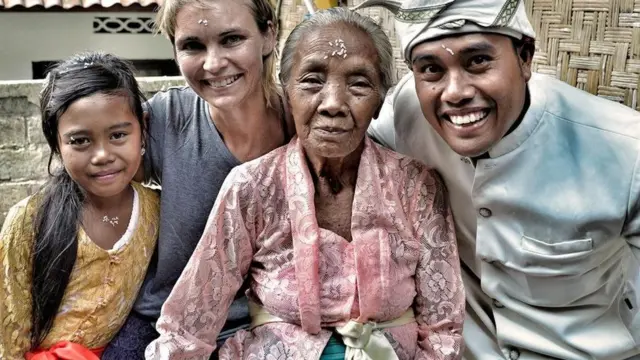10 Famous Balinese Greetings That Will Make You Feel Like a Local

Bali is not just a place—it’s an experience that connects you deeply with its people, culture, and traditions. One of the easiest ways to feel at home and embraced by Balinese culture is through their unique language. The Balinese language, though similar to Indonesian, has its own rhythm, dialects, and expressions that reflect the island’s rich cultural heritage. While each region in Bali has its own way of speaking, there are certain greetings and expressions that you’ll hear throughout the island that I will explain here about Famous Balinese Greetings. These simple phrases can make you feel like a true local.
When you first arrive in Bali, you’ll quickly learn that greetings play a big role in Balinese culture. The locals greet one another with warmth and respect, using phrases that go beyond just saying “hello.” Let me take you through 10 of the most famous Balinese greetings that will not only help you communicate better but also help you connect with the island’s people on a deeper level.
1. Om Swastyastu
One of the most common greetings you’ll hear throughout Bali is “Om Swastyastu,” which translates to “May peace be upon you.” It’s a way to wish good health and blessings to others. You’ll hear it in almost every interaction, from the moment you meet someone to when you leave their presence.
“Om Swastyastu” is used so often that it feels like a spiritual embrace something you can easily pick up and use in your own greetings.
2. Rahajeng Wengi, Semeng, Tengai
As you settle into Bali’s rhythm, you might hear someone say “Rahajeng Wengi” in the evening, which simply means “Good Evening.” It’s a gentle and friendly way of acknowledging others as the day winds down. If you’re up early for a morning stroll, locals may greet you with “Semeng”, or “Good Morning.” It’s a fresh, positive start to the day, and you’ll often hear it as you pass people going about their morning routines. Then Tengai is for “Good Afternoon”
3. Punapi Gatra?
During your travels, you’ll definitely come across “Punapi Gatra?”, which is the Balinese equivalent of “How are you?” It’s an easy, casual way to check in with someone you meet, and the response you’ll likely hear is “Tyang Becik Manten”, meaning “I’m fine, thank you.” You’ll feel the genuine care in these exchanges, as Balinese people take pride in their personal connections with others.
4. Tyang Becik Manten
his is a polite way to say, “I am fine, thank you.” It’s a response to Punapi Gatra? and lets the person know that all is well.
Example: “Tyang Becik Manten, thank you for asking!”
5. Matur Suksma
When you want to express gratitude, you can use “Suksma”, a simple but heartfelt way of saying “Thank You.” If you want to say thank you in a more formal or respectful manner, “Matur Suksma” is a great choice. Either way, the warmth of the phrase will always make you feel appreciated.
6. Ampure
If you find yourself in a situation where you need to apologize or get someone’s attention, “Ampure” will come in handy. It’s a polite way of saying “Sorry” or “Excuse me.” You’ll hear it when locals want to avoid interrupting others or when they need to pass by someone.
7. “Ngudiang” and “Kije”
If you are a curious person, these words are the right one you should to know, “Ngudiang” means “what are you doing”, often used by locals when they are asked to go to somewhere or even just to know what are they doing. It’s a simple yet meaningful way to asking back. When you see someong go to somewhere and you curious to know you can say,” Kije is typically used in a more familiar or affectionate context. It’s a casual words often shared between close friends or family.
8. Tyang Tresna Ajak Ragane
Perhaps one of the most touching phrases you’ll learn is “Tyang Tresna Ajak Ragane,” which means “I love you.” Used between family members, close friends, or partners, this expression conveys a deep affection that’s truly heartfelt and can make you feel like part of the family.
9. Wastan Tyang
This is an informal greeting used when you want to introduce yourself or refer to someone in a casual way. It means “My name is…”
Example: “Wastan Tyang, I’m John from Australia!”
10. Sampai Jumpa
And finally, if you’re parting from someone after spending time together, “Sampai Jumpa,” is the perfect way to say “See you later.” It reflects the idea that you look forward to meeting again, and it’s a phrase you’ll hear often when you leave the company of someone close to you.
Why These Famous Balinese Greetings Matter
By using these greetings, you’ll not only show respect for the Balinese culture, but you’ll also make a positive impression. Bali is known for its strong cultural values, and greeting someone in their native language is a sign of respect and appreciation. Whether you’re exploring Ubud, strolling through markets, or simply enjoying a traditional dance performance, using these greetings will help you connect with the people you meet along the way. It’s one of the simplest yet most meaningful ways to make your Bali experience even more unforgettable.
Ready to Experience More Bali Like a Local?
Now that you’re familiar with some of the most famous Balinese greetings, it’s time to explore the island itself! Whether you want to dive into Bali’s rich culture, relax in its tranquil landscapes, or visit its hidden gems, Lovina Dream Trip has got you covered. We offer personalized tour packages and reliable transportation to make your Bali adventure unforgettable.
Book your tour with Lovina Dream Trip today! Let us help you create memories that will last a lifetime. From cultural tours in Ubud to dolphin watching in Lovina, we’ll guide you through the best of Bali.
Click here to book now or contact us for more information!